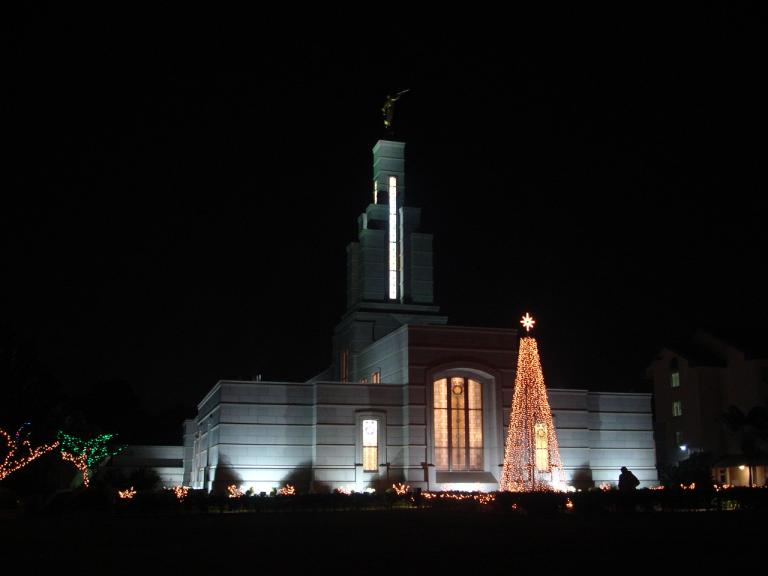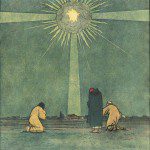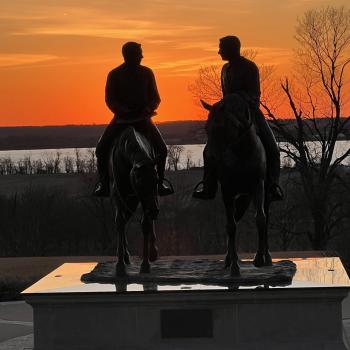
(Wikimedia Commons public domain photograph)
The Christmas season is a busy one. Especially, perhaps, in the United States, where commercialism drives both it and us, and where it falls during a frenetic period known as “the holidays,” preceded by Halloween and Thanksgiving and succeeded by New Year’s Eve and New Year’s Day (to mention only a few of the festivities). It’s easy to lose track of what’s really important.
One way, perhaps, of staying focused, is to make sure that we attend the temple at least once during this period. (Which is rendered somewhat more difficult than it usually is by holiday-reduced temple schedules, school vacations, and holiday-increased demands on our time.)
In support of my point, more or less, I invoke Truman Madsen, who died in 2009 and whom I greatly miss. He changed the direction of my life at a crucial stage, when I was a high school student in California. I probably would not have attended Brigham Young University absent a particular encounter with him. I had him as a teacher when I arrived at BYU. Eventually, he became a faculty colleague, and then a friend. Although, owing to the politics of the region, I haven’t been back to Jerusalem since November 2022, I’ve typically visited the city at least once annually for years now — where, among other things, I taught for nearly six months on the faculty of BYU’s Jerusalem Center for Near Eastern Studies during a period when Truman Madsen was serving there as the Center’s director.
Here are two passages from a devotional address entitled “Foundations of Temple Worship” that Truman delivered at the Idaho campus of Brigham Young University in October 2004:
President McKay asked for a million dollars from the local saints, and had pledge cards before the meeting was over for that amount, plus. Then he spoke about the temple. I’ll spare you the details except for the core statement that I have cherished, and which bent, as it were, the twig in me, which has grown and grown ever since.
He said, “Brothers and sisters, I believe there are few, even temple workers, who comprehend the full meaning and power of the temple endowment. Seen for what it is, it is the step-by-step ascent into the eternal presence. If our young people could only glimpse it, it would be the most powerful spiritual motivation of their lives.” I resolved that day, because of what happened in my heart, always to raise my voice in testifying of the temple and never of criticizing it, to carry out as best I could my dream of finding a queen who would share in me the total conviction that the temple is ours, made for us and prepared for us, and that out of that could come a family who would love the Lord Jesus Christ as nothing else in the universe. . . .
The fulness of truth, and the fulness of the Holy Ghost, and the fulness of the priesthood, and the fulness of the glory of the Father are all phrases that are ocurrent in connection with the temple, and cannot be received anywhere else, nowhere else on the planet. You cannot receive the fulness that the Lord has for you without coming through the temple and having the temple come through you.
In attending the temple, we serve others. We do for them what they cannot do for themselves. And that is precisely what the Savior did, for all of us, in coming to this earth. Service in the temple ranks among the most Christ-like things that we can do.

On Thursday, my blog entry here was already so very long that I chose not to include a favorite piece of Christmas music for that day. But I compensate for that today by offering two:
The first is Gustav Holst’s famous 1906 setting of a poem by Christina Rossetti (1830-1894). The poem has two weak points, in my estimation — apart, of course, from the fact that Jesus almost certainly wasn’t born “in the bleak mid-winter”: First, repeating “snow on snow” twice seems unimaginative to me. Second, so does the vague “if I were a wise man, I would do my part.” (I’ve made the offer before, though, and it still remains: Can anybody else out there improve on these passages?) However, “what I can I give Him, Give my heart” is wonderful. And the second stanza (“heaven cannot hold Him Nor earth sustain, Heaven and earth shall flee away When He comes to reign,” matched by the contrasting “A stable-place sufficed The Lord God Almighty,” is simply magnificent.
Here are the lyrics of the Holst arrangement (which omits at least one stanza of Christina Rosetti’s original) as performed by the Tenebrae Choir, under the direction of Nigel Short:
In the bleak mid-winter
Frosty wind made moan;
Earth stood hard as iron,
Water like a stone;
Snow had fallen, snow on snow,
Snow on snow,
In the bleak mid-winter
Long ago.Our God, heaven cannot hold Him
Nor earth sustain,
Heaven and earth shall flee away
When He comes to reign:
In the bleak mid-winter
A stable-place sufficed
The Lord God Almighty —
Jesus Christ.Enough for Him, whom Cherubim
Worship night and day,
A breastful of milk
And a mangerful of hay;
Enough for Him, whom Angels
Fall down before,
The ox and ass and camel
Which adore.What can I give Him,
Poor as I am?
If I were a Shepherd
I would bring a lamb;
If I were a Wise Man
I would do my part,
Yet what I can I give Him,
Give my heart.
That stable, years ago, was a temple. Seriously. Given the literal presence in it of the Lord himself, what else could it have been?
The second of my Christmas favorites for today is “O Holy Night,” which was originally composed in French. The most stirring portion of the song for me has always been the English verse that reads
Truly He taught us to love one another;
His law is Love and His gospel is Peace;
Chains shall he break, for the slave is our brother,
And in his name all oppression shall cease.
May that day come soon! In the meantime, for something just a bit different and unexpected, here is a rendition of it by the great operatic tenor Jussi Björling. (1911-1960), unfortunately performed in his (though not the song’s) native Swedish.













